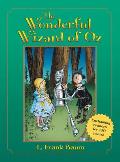“Baum brings to his pages a plenitude of intellectual puzzles”
From Prof. Ellen Handler Spitz’s appreciation of The Wonderful Wizard of Oz, titled “Yellow Brick Philosophy”, in The New Republic:
Though Spitz’s hook is the upcoming movie prequel being made by Sam Raimi (and the word “movie”) is in the URL), her article is all about L. Frank Baum’s text.
The book drops you, rubbing your eyes, into a mysterious ether—onto shifting sands (recall the “Deadly Desert”)—into oneiric realms, where you lose yourself and wander, enchanted: “The cyclone had set the house down, very gently… in the midst of a country of marvelous beauty….” “The road to the City of Emeralds is paved with yellow brick…” “I am Oz, the Great and Terrible. Who are you, and why do you seek me?” Charmed sentences follow one another like dance steps along the winding road itself. Yet few readers have focused on the book’s prodigious mental adventures.I quite agree that Dorothy grows only a little over the course of The Wonderful Wizard of Oz—but there’s a clear difference in her self-presentation when she returns in Ozma of Oz. She’s realized the strength within her all along. Her companions, of course, never quite manage that discovery, and remain enamored of the Wizard’s symbolic gifts.
But first: Dorothy, whose shoes, in the pages of Baum’s story, are silver, not ruby-red, appears before us not as a puppet but as a believable child. Denslow’s line drawings make her out to be no more than six. Who can fail to admire her for slapping the roaring lion’s nose while telling him to be ashamed of himself for trying to bite Toto? And for chastising the Wicked Witch who trips her and steals one of her silver shoes? And for steadfastly denouncing the less-than-candid Wizard and calling his bluff? Kind, gentle, honest, and loyal to her friends, Dorothy is endowed with Aristotelian virtue, with genuine heroism. Some interpreters pretend she grows up along the way so that, by the end, she comes to accept her dull Kansas home with aplomb. But Baum keeps her a little girl from start to finish. Aunt Em asks her on the last page where she has come from. One adverb reveals all: “‘From the Land of Oz,’ said Dorothy gravely.”
Beyond this—beyond magic, fantasy, and psychological verisimilitude—Baum brings to his pages a plenitude of intellectual puzzles. Subtly and with great charm, he explores in children’s terms the realms of ontology, epistemology, and ethics. He actually helps children learn to think. . . .
Though Spitz’s hook is the upcoming movie prequel being made by Sam Raimi (and the word “movie”) is in the URL), her article is all about L. Frank Baum’s text.



No comments:
Post a Comment